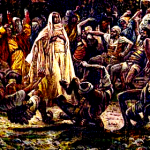by Fr. Patrick Henry Reardon
 Although the Gospel of St. John does not record the Lord’s Agony in the Garden, it does include several texts that put us in mind of that scene inasmuch as they reflect the sentiments and resolution expressed by Jesus during the Synoptics’ accounts of the Agony.
Although the Gospel of St. John does not record the Lord’s Agony in the Garden, it does include several texts that put us in mind of that scene inasmuch as they reflect the sentiments and resolution expressed by Jesus during the Synoptics’ accounts of the Agony.
For example, our Lord’s determination to obey the Father’s will, a resolve so essential to his prayer in the garden, is expressed earlier in John in what he says to the disciples at the Samaritan well:
“My food is to do the will of Him who sent me, and to finish His work” (4:34).
In the next chapter of John, Jesus speaks again of this intended obedience:
“I do not seek my own will but the will of the Father who sent me” (5:30).
Exactly the same resolution on Jesus’ part appears in the chapter after that:
“I have come down from heaven, not to do my own will, but the will of Him who sent me” (6:38).
Two chapters later Jesus says of his Father,
“I always do those things that please Him” (8:29).
In John’s Last Supper discourse, Jesus explains that this obedience to the Father is inspired by love:
“I love the Father, and as the Father gave me commandment, so I do” (14:31).
In John’s Gospel, Jesus’ obedience to the Father is directed to glorifying the Father:
“He who speaks from himself seeks his own glory; but He who seeks the glory of the One who sent Him is true, and no unrighteousness is in Him” (7:18).
This theme of Jesus’ obedience to the Father’s will takes on a more explicitly active tone in John, because this evangelist goes to some length to portray Jesus as disposing of his own destiny. That is to say, John describes Jesus, not as passively submitting to the Father’s will, but as resolutely and actively seeking it. In the parable of the good shepherd, Jesus announces,
“I lay down my life that I may take it again. No one takes it from me, but I lay it down of myself. I have power to lay it down, and I have power to take it again. This command I have received from my Father (10:17-18).”
This more active quality of the Lord’s obedience is likewise indicated in the manner of Jesus’ arrest in the garden. When his would-be captors came to seize him, they were unable until he gave them leave to do so. Thus, when Jesus identified himself to them, John records,
“they drew back and fell to the ground” (18:6).
Truly, no one could take his life. It remained his, to be freely laid down in obedience to the Father’s command.
In a sort of culminating scene, where the language is very reminiscent of the agony in the garden, John again writes of Jesus’ set purpose to glorify God by obedience. In the chapter immediately before the Last Supper, the Lord speaks of his coming death in this way:
“Amen, I say to you, unless a grain of wheat falls into the ground and dies, it remains alone; but if it dies, it produces much grain” (12:24).
Next he describes that death as being “lifted up,” a reference to his crucifixion.
(“This he said, signifying by what death He would die”—12:33.)
Between these descriptions of his approaching death, Jesus speaks of the distress it causes him.
“Now my soul is troubled” (12:27),
says he, in a sentence that reminds us of the Agony accounts in the Synoptics (Matthew 26:38; Mark 14:33; Luke 22:44). Even in this troubled state, however, Jesus does not pray that the hour of his passion will pass Him by:
“Now my soul is troubled, and what shall I say? ‘Father, save me from this hour’? But for this purpose I came to this hour. Father, glorify Your name” (John 12:27-28).
This reference to Jesus’ troubled soul is as close as John comes to an equivalent of the Synoptics’ agony in the garden. Even as he faces death by crucifixion, the Jesus in John’s Gospel remains ascendant in the circumstances of that death. He will not pray to be spared the hour of his passion. With complete command of his destiny, he lays down his life out of love for the Father. When the hour of the Cross arrives, Jesus and His Father speak to One Another only of glory:
“‘Father, glorify Your name.’ Then a voice came from heaven, saying, “I have both glorified it and will glorify it again” (12:28).
And finally, there is the prayer that begins,
“Father, the hour has come, glorify Your Son, that Your Son also may glorify You” (17:1).
